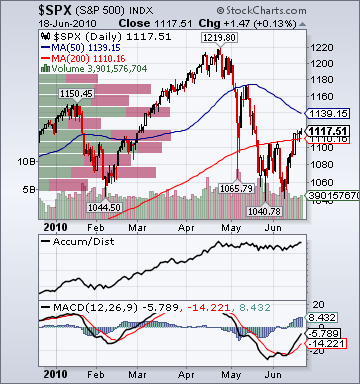Broad Market Tone: - Advance/Decline Line: Slightly Lower
- Sector Performance: Most Sectors Declining
- Volume: Below Average
- Market Leading Stocks: Outperforming
Equity Investor Angst: - VIX 23.91 -4.55%
- ISE Sentiment Index 108.0 +2.88%
- Total Put/Call .87 -2.25%
- NYSE Arms 1.52 -1.42%
Credit Investor Angst:- North American Investment Grade CDS Index 110.10 bps -4.75%
- European Financial Sector CDS Index 133.83 bps -6.07%
- Western Europe Sovereign Debt CDS Index 125.17 bps -12.47%
- Emerging Market CDS Index 252.94 bps -3.0%
- 2-Year Swap Spread 35.0 -1 bp
- TED Spread 44.0 -1 bp
Economic Gauges:- 3-Month T-Bill Yield .09% unch.
- Yield Curve 251.0 +3 bps
- China Import Iron Ore Spot $144.10/Metric Tonne +.70%
- Citi US Economic Surprise Index -15.80 +.1 point
- 10-Year TIPS Spread 2.02% +1 bp
Overseas Futures: - Nikkei Futures: Indicating +50 open in Japan
- DAX Futures: Indicating -3 open in Germany
Portfolio:
- Slightly Higher: On gains in my Technology, Retail and Medical long positions
- Disclosed Trades: None
- Market Exposure: 75% Net Long
BOTTOM LINE: Today's overall market action is mildly bearish as the S&P 500 trades flat despite a large decline in sovereign debt angst and less energy sector pessimism. On the positive side, Coal, Oil Tanker, Oil Service, Energy, Gold, Paper, Networking and Bank stocks are rising .5%+ on the day. The Spain sovereign debt cds is plunging -12.7% to 211.6 bps and the Portugal sovereign cds is dropping -5.2% to 285.3 bps. (XLF) has outperformed modestly throughout the day. On the negative side, Homebuilding, Hospital, Airline, Gaming, REIT and Drug shares are weak, falling .75%+. The Illinois municipal cds is rising another +2.3% to a record 312 bps and the California municipal cds is rising +1.2% to 300 bps. It is also a big negative to see Greece sovereign debt angst remain stubbornly high. The Greece 10-year/Bund spread is slightly higher today to 667 bps. The Shanghai Composite continues to trade poorly despite recent global equity gains, falling another -1.84% last night. The large declines in the eurozone financial sector cds and western europe sovereign debt cds indices are large positives. I will closely monitor the market's action early next week before further shifting market exposure. I expect US stocks to trade modestly higher into the close from current levels on short-covering, falling sovereign debt angst, declining energy sector pessimism and technical buying.
